Symbolism In Meher Baba Love

Dynasties, Burqas, Pralaya Reservation
By Malladi Rama Rao
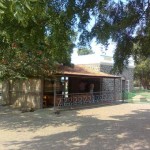
TOMB SHRINE, MEHERABAD
New Delhi: Today is Feb 7. It was on this day in 1969 the physical body of Meher Baba was interned in the tomb atop the Meherabad hill. That day also marked the birth day of the Avatar according to the Parsi calendar. What a symbolism it was? Births and deaths are an illusory phenomenon. And for the Avatar there is no birth; there is no death; he remains eternal.
The tomb shrine came up in the twenties. For the Meherabad residents of the day, as Bhau Kalchuri points out in his magnum opus, Lord Meher, it was just a pit room – a room with a pit in the centre, a window on the right and a roof above. Meher Baba used to spend long hours inside the pit. Over the next couple of decades, the pit room’s significance became a matter of public knowledge. And there were occasions when Baba ‘conducted’ his lovers to the tomb and even asked a lucky one or two to stay inside the pit.
My mother and my two kid brothers were at Meherabad along with our kid sister as Baba’s body that was lying in the pit disappeared from public view. How lucky they were ! They were able to have the last mass darshan. I still, even at this distance of time, find it difficult to resist the temptation to feel envy of them. You see, I reached the Hill by Feb 2 night along with a group of Baba lovers from Guntur and along with them returned home three days later. How I reached the place and how I survived the biting cold in the night with no warm clothes, and with no thick blanket, is a story for some other day. This journey marked my life’s journey, away from the protective care of my parents.
It may be amusing to read what I am going to say. Father never allowed me to venture out of our village to Guntur, the district headquarters town ( distance some 30 km). Even to see a district level science exhibition lest this 19-year –old could get lost in the mad, mad world. Yet, here I was boarding a bus for Meherabad, some 700 km away, all alone. Those days there were no cellular phones. Telephones were also not ubiquitous. You simply booked a call and waited for the phone connection to materialise. For this luxury, one had to visit the telegraph office. So, I did the next best – sent a cable to father suggesting that he and mother should rush to Meherabad.
In a way, the journey marked the beginning of my love with newspapers. I was not new to newspapers. Whatever be the pressures on his purse, father always ensured that I would get my three-four newspapers and a couple of magazines. Andhra Pradesh did not have a proper delivery system in the fifties and sixties. My ‘quota’ came by post. Probably, father could not have visualised that newspapers would become my addiction and a source of living. Not even I.
WELCOME RAM SINGH KALCHURI
All these events of the past came flooding as Bhau Kalchuri, Chairman, Avatar Meher Baba Perpetual Public Charitable Trust, AMBPPCT, called me to the Amartithi stage on Jan 31. I was sitting in the third row of the audience. As he came to the stage, he spotted me. And as is his wont, he made a symbolic twisting of his non-existent mustache, ‘muche’. I responded in the only way he expects me – twisting my long luxurious ‘muche’.
There are Baba lovers and Baba lovers who sport muche. But it is my good fortune that I could catch the Bhau’s attention three years ago during an internet chat session at the Trust Office. To our surprise and to our acute discomfiture, Bhauji showcased me and Vani on the Internet. And introduced us as members of the extended Kalchuri Dynasty. Soon I became his Ram Singh Kalchuri
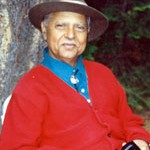
Bhau Kalchuri
‘You are coming to Amartithi’, he said during one of my visits to Trust office in June. It was not a command. It was a simple expression of an expectation. ‘Sit in the front row. I will introduce you to every body’.
Bhauji pulls your leg, takes a dig at you and even upbraids you – all laced with humour. But there is an undercurrent of seriousness in whatever he says.
One can catch the seriousness if one is alert. Otherwise one is prone to take his remarks as a joke. And commit the mistake of ignoring the remark. Even forgetting it.
Like for instance, his repeated references to what Baba had said in the fifties about one fourth and three-fourths worlds. About it a little while later.
So I was there amongst the audience in the enclosure close to the Amartithi stage. I was feeling a bit sleepy though. Vani and Sheela were also in the audience, seated cross legged outside the enclosure. While fighting to keep sleep at bay, I noticed commotion in the front row. Bhauji’s relatives came from his native place near Nagpur. Some of them are elderly. Some in the middle age bracket.
Soon came a word from the stage: Bhau wants the Kalchuri dynasty to come on stage. The family members get up from their chairs. Some of them climb the stage and meet Bhauji. Again the Master of Ceremonies announces ‘Bhauji wants all the members of the Kalchuri dynasty to come on the stage’. Some more members go up the stairs.
DYNASTY ON STAGE: MYSTERY DEEPENED
From my chair I could see Bhauji was receiving every one of the Kalchuri dynasty- for some a shake hand, for some a hug, for a few a pat on the shoulder or a kiss on the cheeks. All this must be a great strain on his body. Remember Bhauji has had 21 operations. He cannot stand comfortably. And he needs constant ‘medication’. I began to wonder what a stamina Baba has given Bhauji.
Disturbing my revere came one more announcement, not once, but twice in quick succession- a call to the Kalchuri dynasty to come on stage. There was an element of restlessness in the air. And the way Bhauji was looking made me feel he wanted me to join the family on stage.
Does he really want me on the stage? Just because he ‘elevated’ me to the dynasty, should I go on the stage when it is a purely Kalchuri family gathering? Will it be fair for me to go on the stage? What will others think of me? Will they dub me a mad cap?
I was confused. I didn’t know what to do, frankly. In helplessness, I looked unto Bhauji, silently asked: ‘Shall I also come’. He understood my dilemma. And signalled ‘don’t worry. Don’t come’. It is Bhauji’s greatness that he referred to my dilemma as he took the mike a short while later. Conveying that he has pardoned my ‘indecision’, he told the huge gathering of Baba lovers, ‘I wanted him to come. But he felt that he could not as he is an ordinary person, not a member of the dynasty. I understand …’
His words had a soothing effect on me. By then, all dynasty members returned to their chairs. And stood up twice in their chairs on the left side of the enclosure.
One of them, who is a regular at the Hostel D, signalled that I should twist my ‘muche’. I obliged him as I stood up in my seat on the right side of the enclosure.
What about him? You see, this member of the Kalchuri dynasty may have the royal blood in his veins but he has no ‘muche’!
Next Day, Feb 1, Vani and I met Bhauji as he arrived at the Amartithi stage. He did not look at me. Nor did he accept my greetings. He only spoke to Vani.
‘Yesterday, I called him (that is me)… I wanted to introduce him to every one. He did not come’, Bhauji told her. She replied: ‘You know, Bhauji, Rao is always like this. A bit hesitant to do any thing. I remonstrated with him. Today you call him. He will come (to the stage)’.
I was amused at the conversation – Bhauji complaining; Vani explaining. What a scene it was to watch. More about it some other day.
I did not expect a call from the stage. But it came when Bhauji was addressing, rather midway through his address. This time I went up; stood like a disciplined soldier; answered the two or three questions put to me. I wanted to return to my seat. But stopped in my stride as Bhau said ‘Where are u going. Remain here’. A while later, Dhake, the master of Amartithi ceremonies, made me sit by his side.
More or less the same sequence of events followed at the Volunteers meeting held later at the Hostel –D.
ONE COMMENT-ONE ADVICE
For those wondering about the Kalchuri dynasty mystery, I offer only one comment. And one advice.
My comment: Bhauji is not the one who speaks flippantly.
My advice: Go to the Internet. View the web cast of the function. Listen to each word with attention. Play the web cast for a second time. The winter frost will melt away.
For those of you who don’t have the luxury of accessing the Web cast, well, here is my note to put issues in perspective.
To be on the safe side, I placed before Bhauji my interpretation and asked him whether I was right or off the track. I sought an early reply because of the deadline to this column. Like always Bhauji was generous.
“I can understand …. Why you want early reply. Just see, though I am busy, still very busy, I am giving you reply”, he wrote in his e-mail response in less than 24-hours.
And added: “I permit you to write about my Amartithi speech in your new column… Whatever you understand, it is 100% right…. You understood perfectly well”.
Now what is my interpretation?
If you notice – rather listen, Bhauji draws your attention to the fact that Kalchuris were great rulers in Rajasthan, Western India. Arte-facts of their period are on display at an archaeological museum in Jabalpur, which incidentally is an important Baba centre in today’s Madhya Pradesh. This historical fact cannot be wished away.
The advent of British colonial rule saw the decline of the Kalchuri rule. Over time, they lost their kingdom and were left with barren land and some forest tracts. Most families of the dynasty migrated to Central India, and finally settled near Nagpur, where Bhauji was born.
DYNASTY-DEMYSTIFIED
According to Bhauji, initially the dynasty members tried their hand at business. ‘Honesty is not a virtue for business. So they failed’. It was then they had thought of education as a means for livelihood. Bhauji was among the early beneficiaries of the decision.
‘What is so great in this story? There are many more such families big and small in India’, you may ask. The key to your question is in Bhauji’s Amartithi speech and the questions he asked me on stage. Play the web cast. You will know for sure.
What did Bhauji ask of me? He asked: “where are the members of the dynasty today. What are they doing? What are you doing for a living?”
For me, these questions sounded very innocuous as I heard Bhau.
So I replied in a matter of fact manner: “Oh! Dynasty members have come to Baba. And are working for Baba (You see, my reference is to Bhauji himself. I thought it was indeed a clever reply). For my living I work on computers and Internet. (This is true. He knows).
Hearing this, Bhauji remarked: ‘See, he is from Kalchuri dynasty. But today what he is? He is making a living on computers’.
Some one from the audience (at the volunteers meeting) asked: ‘How were the volunteers like during the first Sahavas?’ To me the question appeared as an attempt to divert Bhauji’s attention. He, however, ignored the questioner and went on to speak about the Kalchuri dynasty.
ANALOGY- A METAPHOR
What did he say?
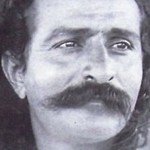
Meher Baba
He said (in Hindi): Change is the norm of life. Everything keeps changing. (pointing towards me) He is from the Kalchuri dynasty but now he has become an editor. Others (of the Kalchuri dynasty) are doing different things. No dynasty. God alone is there. He is permanent. All others change. Change is in illusion. So remember Him, Baba, the Avatar. He has come to us in human form.’
By now the reader must have appreciated the symbolism in Bhau’s speech, I made a reference to at the very outset.
Let me elaborate. His audience is mostly made up of people from rural Maharashtra and rural Uttar Pradesh, who saw royals and feudalism first hand and have experienced the change that has come about in democratic India. The Iranians who have come in large numbers also are in a position to know the truism Bhauji was referring to.
What about the large group of Baba lovers from Andhra Pradesh?
Well, they have some difficulty to appreciate the metaphor Bhauji is using.
Firstly coastal districts and Rayalaseema regions from where bulk of Telugu speaking Baba lovers come enjoyed the fruits of British rule. It means better communications, better education and simply better living when compared to say a place like Hamirpur belt. Secondly because for most people from coastal and Andhra and Rayalaseema, feudalism and royals are text book stories, and celluloid scenes.
A look at the women section of the volunteers’ meeting made this very clear.
Bhau spotted a couple of women who had pulled the ‘pallu’ of their saree over their heads virtually making their face invisible. Ghunghat, as it is called, is a custom observed in Hamirpur and also across UP, Bihar, Rajasthan and parts of Maharashtra even today. It is a custom. So they are doing it. Such customs are not practiced in coastal Andhra for instance. Baba during his Hamirpur visits sowed the seeds of change in custom. He even had a special sahavas when women were allowed to sit on chairs and eat food on tables. The fruits of Baba seed we are seeing today with women largely adapting to the changing times.
In short, what Bhauji is telling with the analogy of Kalchuri dynasty?
He is saying: Dynasties come and go. Kingdoms come and go. In fact, the dynasties and kingdoms and kings and queens have gone with the winds of change. Kings are replaced by Ministers and officers. Don‘t run after them. They too are not permanent. They too don’t last long. The only one permanent is God- the Paratpara Parabrhamma. He is always there. He has come to you as Avatar Meher Baba. Follow Him. Love Him as He should be loved. He will give you the universal push. For you and many like you who love God.
NO TV EVANGELISM
I, for one believe, Bhauji has been driving this message for a while. If memory serves me for over three years. He is not a Television evangelist. There is no need for him to be one either.
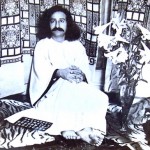
Meher Baba in 1930s
As the ‘night watchman’ of Baba and as the biographer of Baba, Bhauji knows first hand what he says is true. He is a good story teller cut in the mould of a grand father who keeps telling stories to the grandchild.
Grand fathers always make rambling narratives. Because they are not TV anchors. For them what matters is the content and not the style. For them, the audience is not intellectual giants but tender tiny tots in their formative age who are ever willing to listen and learn. For this audience, there is no need to tell the moral of a story bluntly like in a detergent advertisement. These audiences are receptive to the same story told again and again and are quick to capture the nuances. They are not argumentative but are intelligent.
Fathers, who have graduated to grandfather-hood, know this truism.
Now about the one – fourth and three-fourth, Bhauji keeps referring to these days. And in fact spoke about at the Amartithi 2010 and Volunteers Meeting 2010.
Let me point out that this is not a new theme that has been popping up in Bhauji’s speeches. It made its appearance for the first time in the mails that came from Bhauji in what I call the ‘Yadrakh’ series of mails.
Yes, it is, however, only these past few months that Bhauji is making pointed reference to the one-fourth and three-fourth worlds both in his public addresses and internet chats.
And every time he makes this reference, he concludes with the observation: ‘Baba lovers have no reason to worry’.
When I heard Bhauji at the volunteers meeting and later while discussing the subject with noted Baba lovers Balakrishna Meher, a Hyderabad based air force officer, and Sanyasiraju, Vizianagarm based singer and composer, I began to wonder what could be the latent message.
Is Bhauji referring to Pralaya? And as Balakrishna remarks, is Bhauji giving a subtle hint?
NO WORRY – SEAT RESERVED
‘Seats of Baba lovers are reserved in the ship. They must keep looking straight when seated in the ship’, says Bhauji while drawing your attention to a ‘fifties’ circular from Baba. When it was issued, the circular caused a major commotion amongst Baba lovers. But over the years, the circular and its contents were forgotten.
Till Bhauji resurrected them in his own understated way.
As Vani says, while talking of Baba and of what Bhauji says, we should not think through out head but speak through the heart. So, I placed my doubts before Bhauji.
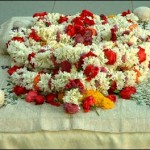
Samadhi
He replied thus:
“Yes, you can interpret as Pralaya. This is Pralaya – partial, not Mahapralaya. Mahapralaya means the whole Creation is submerged in Divine Ocean for a long time, and God in form of the Avatar takes rest.
When the force of illusion increases and increases, at that time Mahapralaya takes place. This one quarter and three quarters will be partial – pralaya – not Mahapralaya.
As this is pralaya, not Mahapralaya, the one quarter will be saved, and they will turn towards the Truth. They will not see this side or that side, but straight towards God, who is carrying the ship, in the form of Meher Baba.
Not only Baba lovers, but God-loving people – they are all Baba lovers.
The ship is the simile which indicates the reason why they will not look this side or that side, but straight towards God in form of Baba.
It is a long thing to make this point very, very clear, but this is sufficient.
I was really cautioning Baba lovers that they should focus towards Baba, because He is in form as the Avatar.
You are right, and you did the right thing, and that’s why you have good mustache and you look like you are from Kalchuri dynasty”.
I rest my case.
-
Book Shelf
-
 Book Review
DESTINY OF A DYSFUNCTIONAL NUCLEAR STATE
Book Review
DESTINY OF A DYSFUNCTIONAL NUCLEAR STATE
- Book ReviewChina FO Presser Where is the fountainhead of jihad?
- Book ReviewNews Pak Syndrome bedevils Indo-Bangla ties
- Book Review Understanding Vedic Equality….: Book Review
- Book Review Buddhism Made Easy: Book Review
- Book ReviewNews Elegant Summary Of Krishnamurti’s teachings
- Book Review Review: Perspectives: The Timeless Way of Wisdom
- Book ReviewNews Rituals too a world of Rhythm
- Book Review Marx After Marxism
- Book Review John Updike’s Terrorist – a review
-
-
Recent Top Post
- NewsTop Story Record Pentagon spending bill and America’s hidden nuclear rearmament
-
 NewsTop Story
Taliban Suffers Devastating Blow With Killing Of Minister
NewsTop Story
Taliban Suffers Devastating Blow With Killing Of Minister
-
 China NewsCommentaries
Reality Shadow over Sino-American ties
China NewsCommentaries
Reality Shadow over Sino-American ties
-
 CommentariesNews
Ides of trade between India and Pakistan
CommentariesNews
Ides of trade between India and Pakistan
-
 CommentariesTop Story
Palestinians at the cross- roads
CommentariesTop Story
Palestinians at the cross- roads
-
 CommentariesTop Story
While Modi professes concern for the jobless, “his government’s budget escalates class war”
CommentariesTop Story
While Modi professes concern for the jobless, “his government’s budget escalates class war”
-
 CommentariesNews
Politics of Mayhem: Narrative Slipping from Modi ….?
CommentariesNews
Politics of Mayhem: Narrative Slipping from Modi ….?
-
 Commentaries
Impasse over BRI Projects in Nepal
Commentaries
Impasse over BRI Projects in Nepal
-
 CommentariesNews
Yet another Musical Chairs in Kathmandu
CommentariesNews
Yet another Musical Chairs in Kathmandu
-
 CommentariesTop Story
Spurt in Anti-India Activities in Canada
CommentariesTop Story
Spurt in Anti-India Activities in Canada
AdSense code


















